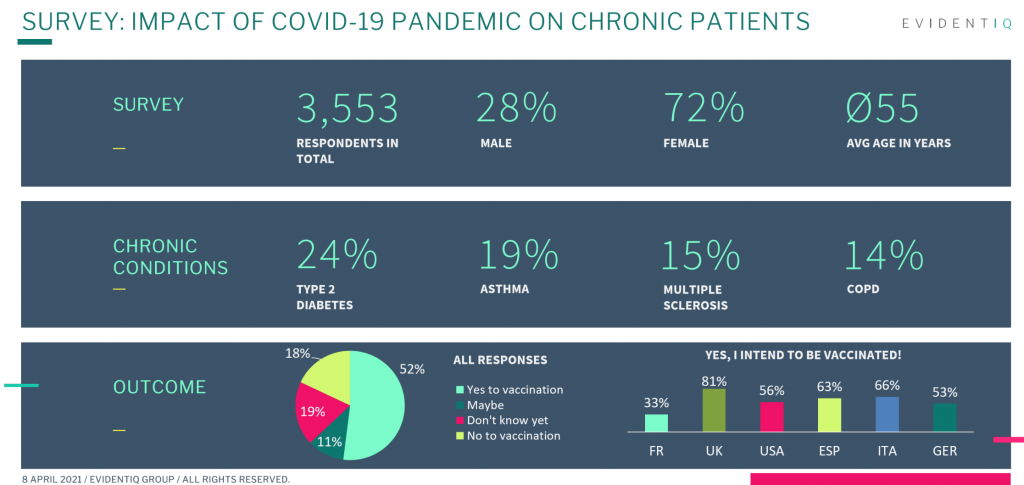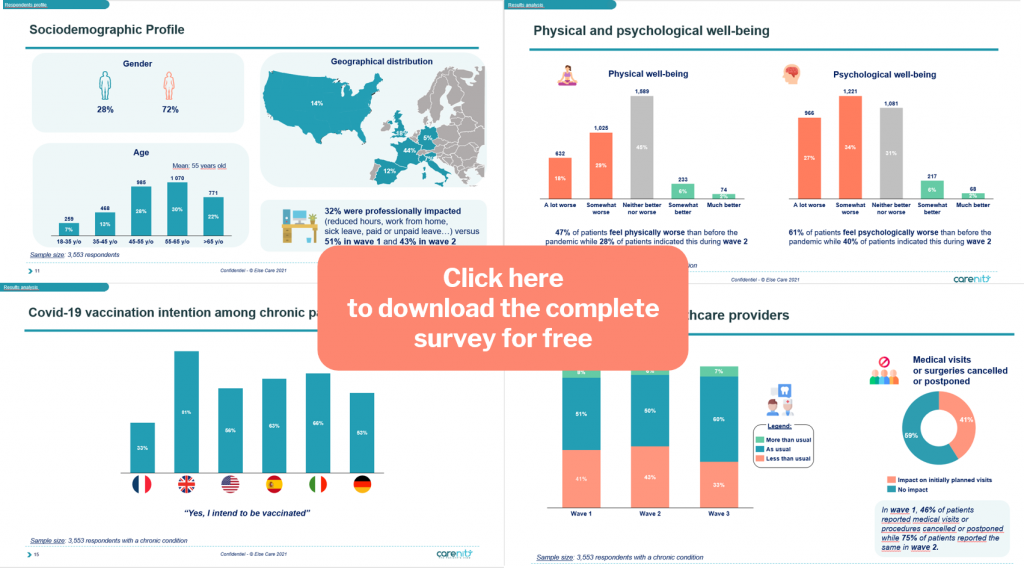I’m Gilda Teissier, Executive Marketing Director at EvidentIQ and I recently met with Michael Chekroun, Founder and CEO at Carenity and Chief Strategy and Transformation Officer at EvidentIQ Group for this interview.
COVID-19 has been among us for more than a year now and it has impacted the life of every person in the world. It goes without saying that certain populations have been more affected than others.
Carenity, part of EvidentIQ group, is a leading digital patient platform with 500,000 patients and caregivers worldwide. In the context of COVID-19, Carenity’s mission has been more than ever to support its patient community and to help healthcare actors quickly access the best possible data to provide the highest quality of care to patients. In this sense, Carenity has set up an online survey to measure the impact of COVID-19 on access to care and quality of life in real-time for chronic patients, a population that is particularly vulnerable in a context of pandemic and lockdown. While attention is primarily focused on those affected by COVID-19, the risk of poor, insufficient access to care for chronic patients is real, with potential dramatic consequences. Will chronic patients be the collateral victims of the epidemic?
This survey was conducted at three different periods in the following 6 countries: France, the UK, Germany, Italy, Spain, and the US. The first survey was conducted during the first lockdown in Q2 2020, the second after the summer 2020, and the last from December 2020 until April 2021. The results from all three surveys have been shared with both the patient and healthcare communities. Today we have the opportunity to get some deeper insights on the key results thanks to Michael Chekroun, Founder and CEO of Carenity and Chief Strategy and Transformation Officer at EvidentIQ Group.
Gilda: Michael, what made you conduct this survey in the first place? and who did you interview? Was it a special group?
Michael: The pandemic suddenly sent the world into a state of shock in early 2020. The sense of uncertainty was amplified by the lockdown measures that followed in many countries. At Carenity, we wanted to know what impact this crisis would have on patients with chronic illnesses, both in terms of access to care and impact on their quality of life, to find quick solutions to protect an already fragile population.
“We wanted to know what impact this crisis would have on patients with chronic illnesses“
Gilda: One of the central questions was about patients’ intention to be vaccinated. What did you find out about people’s willingness to get vaccinated and what do you think are the reasons?
Michael: We surveyed over 3,500 people in Europe and the United States. The results show that there is a strong motivation to get vaccinated. 48% of respondents said it is because they were at risk, 46% wanted to protect others and 41% just wanted to protect themselves from the virus. That said, the survey indicates that the willingness to be vaccinated differs massively between countries.
“The willingness to be vaccinated differs massively between countries”
Gilda: When it comes to medical consultations and healthcare professionals, have you seen an improvement in the situation with regard to medical visits or procedures being canceled or postponed since the first lockdown? What do you think is the reason for this?
Michael: Nearly half of those surveyed reported that their medical visits or procedures were canceled or postponed during the 1st wave of the virus, during the spring of 2020, while 75% reported experiencing the same difficulties in late 2020 and early 2021. It is difficult to estimate the long-term impact, but many physicians are already concerned about the deteriorating health of their patients.

Gilda: There are many digital solutions now offering teleconsultation services. Based on the barometer’s findings, do you think there is a real market out there for video consultation platforms?
Michael: Yes, absolutely. Roughly 67% of patients in the US would be willing to use telehealth consultations and in Europe 47% of respondents are open to telehealth. I see a bright future for these innovative services, as the COVID-19 crisis has accelerated the adoption of telehealth services by the general public and health care professionals.
Gilda: Physical and mental health have been an important element and a casualty of this pandemic. Have these two aspects also worsened for people living with chronic illnesses and to what extent?
Michael: The pandemic is expected to have a long-term effect on the mental health of people populations around the world, especially the youngest and most fragile. Again, it is difficult to estimate the long-term impact, but we can already see that the number of digital solutions related to mental health is booming. It is one of the most followed subjects by VCs in the US.
Gilda: Information is essential when faced with uncharted territory such a pandemic, and most of all when living with a chronic condition. Has people with chronic conditions been given enough information? What do patients think?
Michael: Information is not the problem. We have been literally inundated with information about the virus, its impact, its variants and its treatments. So much so that everyone feels able to judge the effectiveness or the safety of a particular vaccine. Moreover, a majority of the patients surveyed consider themselves well informed about the virus or the vaccines. The challenge now is to understand the long-term impact of this virus, the effects of which can last several months and which experts now call “long COVID”. Even if we can see the light at the end of the tunnel thanks to vaccination, we must remain cautious in a field where knowledge evolves daily.
“The challenge now is to understand the long-term impact of this virus”
Gilda: Thank you Michael
Do you want to discover all the results? Join us on June 17 at 17h CET for our webinar on The Impact of COVID-19 on Patients with Chronic Illnesses! Register here

